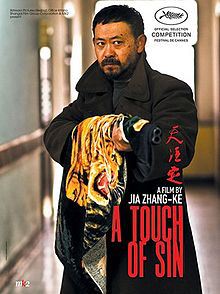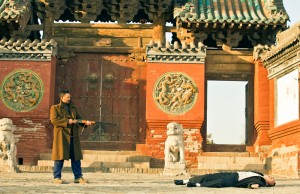Just for Fun – Movie Review: Jia Zhangke’s Ash is Purest White
Just for Fun (“JFF”) is a sporadic series on China Law & Policy where we take a break from the more serious aspects of China’s development. JFF often features movie reviews, art reviews, or anything else that could be considered “fun.”
Bin and Qiao, the two lovers at the center of director Jia Zhangke’s new masterpiece, Ash is Purest White (江湖儿女), are having the time of their lives as the film opens. It’s 2001 and Bin (Liao Fan) is a successful gang leader in the declining industrial city of Datong. Qiao (Zhao Tao) is his dutiful girlfriend, always by his side, collecting money at the mahjong tables on his behalf and picking up Bin’s gun when he accidently drops it on the dance floor. She is also the sole care taker of her father, a man who once was an important leader in Datong’s coal mines when those mines were flourishing. Now he commandeers the neighborhood loudspeaker for his drunken tirades.
But Bin and Qiao are united in their belief in the gang world’s longstanding code of loyalty; loyalty to each other, loyalty to their family, and loyalty to the gang. But that loyalty is tested when Bin is attacked by a rival gang – an exciting, kung fu-inspired fight scene – and Qiao saves his life by firing his gun. Both are arrested but its is Qiao, never revealing that the gun was Bin’s, that takes the fall with a five year sentence for possession of a gun. When Qiao is finally released, there is no Bin waiting for her. Instead, she has go find him, journeying through parts of China hundreds of miles from her home.

Her search for Bin takes her to one of the small river towns in the Three Gorges valley. It is 2006 so while the town still exits, its demise is imminent. Beautiful shots of the Yangtze, flowing through the town, are punctured with the shrill sound of public announcements, instructing local residents to pack up their bags because their town of over 2,000 years will soon be flooded into oblivion with the construction of the Three Gorges Dam. It is clear that Qiao is beginning to realize that she is in a new China. And it becomes clear to the audience that while Ash is Purest White is ostensibly a story about love lost (not surprisingly Qiao finds out that Bin left her and gang life) it is more a story of China during those first two, tumultuous decades of the 2000s.
And Jia quietly captures the momentousness of those two decades, both while Qiao is in the Three Gorges Valley and on her train trip back to Datong, where she ends up encountering the first of the new Chinese, a rugged adventurer, with Western-style backpacker gear, on his way to Xinjiang to search for UFOs. When Bin comes to see her ten years later, she meets him at the high speed rail station clasping her smart phone. Ever loyal to the gang and to the life, it is Qiao who now runs the Datong mahjong parlor and has become an underworld boss. It is also Qiao – still loyal to Bin – who nurses him back to health.

Ash is Purest White shows why Jia Zhangke is one of China’s greatest directors. The genius behind Jia, which is perfected in this movie, is his ability – without any words – to communicate the confusion and uncomfortableness of living in a country that is undergoing one of the fastest economic transitions the world has ever seen. Qiao’s loyalty is admirable and because the movie centers around her (with Zhao Tao giving one of her best performances), we are able to see her transform and become a stronger woman. But in the end, she is still stuck in Datong; her commitment to the past – the code of loyalty – keeps her there. Bin on the other hand is not; he’s on the move, able to forget the codes of the past. And in a country like China, is it better to hold on to the past or to be constantly on the move? Ash is Purest White never answers that question, but, by asking it, the movie shows the difficult spot that China and its people are in as the country continues to develop at breakneck speed.
Rating: 




 On Facebook
On Facebook By Email
By Email 



